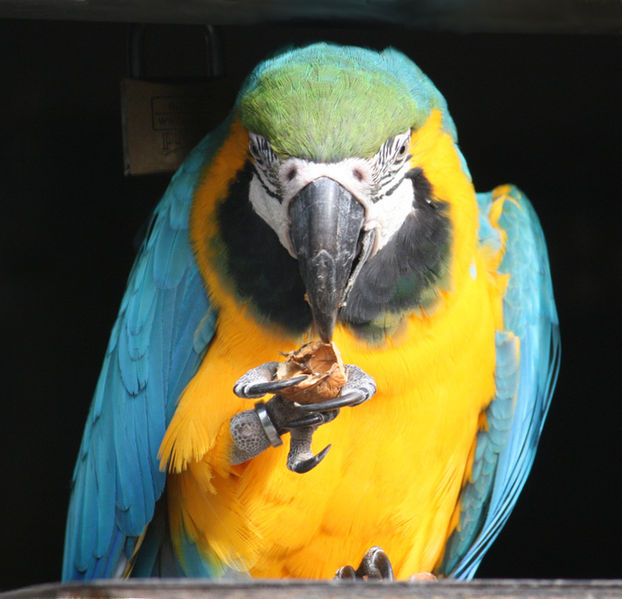 Even the smallest lovebird can deliver a painful bite, and larger parrots are capable of inflicting serious injuries. If a parrot bites and holds on, you must respond appropriately in order to limit the bite’s severity.
Even the smallest lovebird can deliver a painful bite, and larger parrots are capable of inflicting serious injuries. If a parrot bites and holds on, you must respond appropriately in order to limit the bite’s severity.
Do Not Pull Away
In a lifetime of working with animals, I’ve actually been bitten by more snakes than parrots, but the principals are the same. One’s first reaction – to pull away – must be stifled. Instead, push the bitten hand (as an example) towards the parrot’s head. This will relieve pressure on your hand and may force the bird to relinquish its grip. Pulling away will add to the trauma of the bite…I learned this when a concave-casqued hornbill broke my finger; pulling away from an anaconda left me with a souvenir – a tooth that remains buried in my wrist to this day!
Balance
You can also try to disturb the bird’s balance, forcing it to focus on that and to release you. This is best accomplished by tilting the hand or object upon which the parrot is perched (note: do not tilt your hand if the parrot is biting the hand upon which it sits).
Tools
When working closely with birds likely to latch onto me, I always carry an easily accessible object to force into an offending bill. Credit cards, butter knives and spoons will all serve well, depending upon the size of your attacker.
Additional Tactics
Putting the parrot on the floor and/or covering its head with a towel may also cause it to withdraw. A sudden loud noise can also be useful in distracting and startling an aggressive bird.
You might try smacking your hand on something, stomping your foot or turning on a radio if within reach.
In all cases, direct eye contact with the bird should be sought…this does not always work, but excellent results are sometimes forthcoming.
Medical Concerns
Be sure to seek medical advice after being bitten by any animal. Even the smallest of wounds can leave one open to dangerous infections. Do not assume that because your parrot is kept indoors there is no risk of infection – call your doctor!
Further Reading
Parrot screaming can be as dangerous to one’s mental health as biting is to physical health! For further information, please see my article Help! – My Parrot Won’t Stop Screaming.
Image referenced from Wikipedia and originally posted by snowmanradio.
 That Bird Blog – Bird Care and History for Pet Birds
That Bird Blog – Bird Care and History for Pet Birds

Please help…..I have a male and female Eclectus . The male has started biting and very very hard. What can I do to stop this. Im affraid to touch him now. Ive considered getting rid if him, but feel sick about it.
Thanks for your interest. Here are quite a few things that can lead to a change in behavior and biting. The male may be coming into breeding condition…males and females often become protective of their mates at this time. This is hormonally controlled, and really cannot be altered…only way around it is to avoid contact until the pair breeds or the hormonal surges subside. Birds that do nest may become very aggressive to their owners, even after many years of co-existence.
If anything else has changed – a new pet, new cage etc., please let me know and we can look into it further.
Please let me know if you need any further information. Good luck, enjoy and please keep me posted.